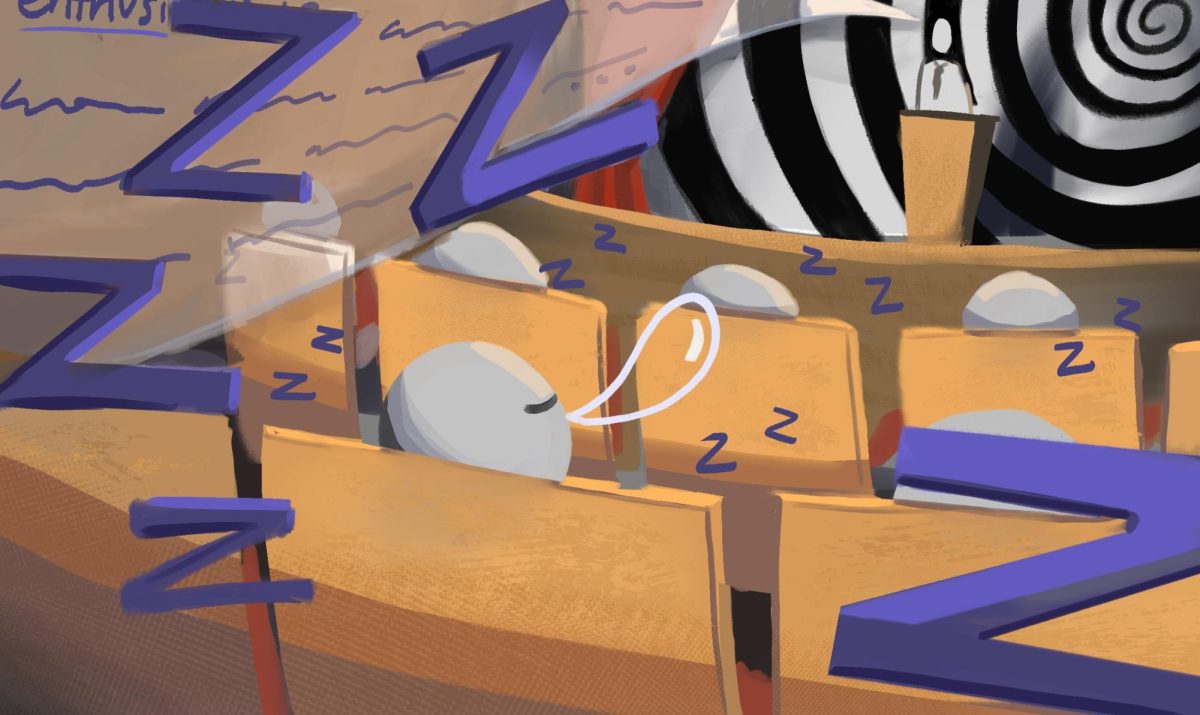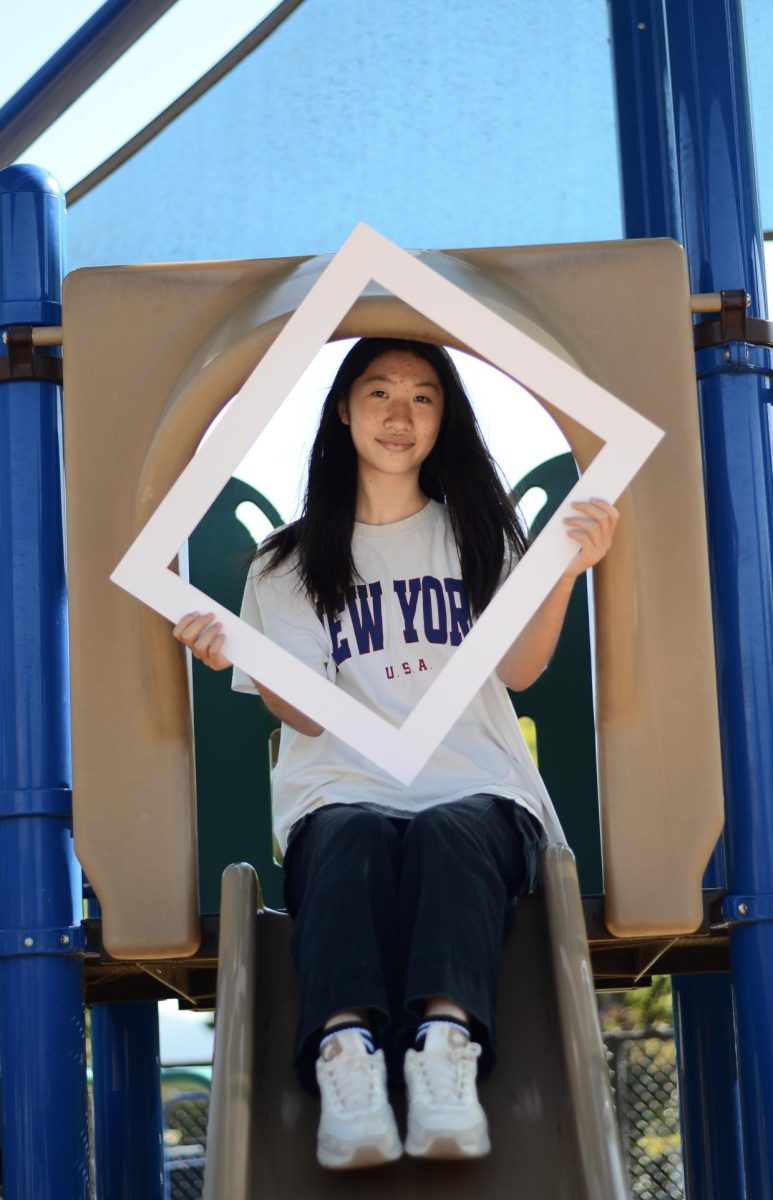“4.0 GPA, valedictorian, founder of a nonprofit, winner of a research competition, yet rejected from their top schools.” Instagram videos revealing the “stats” of various college applicants flood my feed, showcasing students who seem to do it all. Each of those reels plants a seed in my mind, whispering that all my efforts will not be enough. Doom scrolling is no longer an escape from stress — it is a cause of anxiety and competition.
Out of 115 respondents to a school-wide survey, 86% believe leadership is necessary for a “strong college application/resume,” with 70.2% naming high achievement in a competition as a close second. As the college application process becomes more competitive, students are scrambling to do anything that might make them stand out, whether or not they love the activity itself. There is almost an unspoken “to-do list” among parents and peers for students to complete as they go through high school — research, competitions, arts or athletics.
Especially at Harker, the highly competitive environment pushes many students to take on more activities, regardless of their interest. 51.2% of respondents said they participate in four or more extracurriculars. On top of Harker’s rigorous coursework, students feel they must juggle other extracurricular activities. Though 94.2% of respondents said they pursued these activities out of genuine interest and passion, 66.9% of respondents also named college applications as a major motivator.
I often hear students saying they think their accomplishments are not “good enough” to be accepted into a certain college or summer program and what they do is “not enough.” This mindset is not only mentally and emotionally detrimental, but it also makes students consider hobbies as “useless.” I know students who have given up on art, saying, “It doesn’t add much to my application.” Would they still be doing any of those “useful” activities if there were no college application waiting at the end of the road?
With so many students across the nation applying for the same top universities, it’s becoming more and more difficult to “stand out” as an individual among a sea of applicants. But the term “standing out” is completely ambiguous — does it mean being better than everyone else at the same thing or doing something completely different?
Nowadays, it seems that everyone has a “passion project,” and it’s hard to tell whether it’s really a genuine interest or just another accomplishment to add to their application. This cycle perpetuates itself, as students continue taking on more of the same activities as their peers in an effort not to “fall behind.” So, it becomes harder and harder to stand out, let alone excel.
Even so, 81.8% of respondents rated their need to excel at most or even all of their extracurriculars as “4” or “5” out of five. But trying to excel at everything will cause burnout. This mindset transforms hobbies into obligations and interests into achievements, piling unattainable expectations onto students. The desire to gather accolades clouds their perception of what they love and what they do, just for the sake of adding it to their LinkedIn page.
Of course, it is completely natural to want to be good at what we do, and that sort of drive and ambition is incredibly valuable. The problem arises when students choose activities solely for the sake of being good at them. Ideally, that motivation should come after enjoyment and interest, not before. But when we start doing something just to excel, we miss the chance to figure out why we care about them in the first place.
Some schools are already beginning to adopt initiatives to shift the focus on college applications to depth of commitment over breadth of achievement. Harvard’s “Turning the Tide” college admissions campaign aims to emphasize community engagement and minimize “excessive achievement pressure” for high school students. Though this advocacy program might seem to encourage the pursuit of passion, many students only end up adding community involvement just to appease college admissions officers rather than out of genuine interest.
It’s time to ask ourselves why we do something rather than what we’re doing. Even such a simple question can shift our mindset to pursuing passion rather than grasping for achievement.


















![“[Building nerf blasters] became this outlet of creativity for me that hasn't been matched by anything else. The process [of] making a build complete to your desire is such a painstakingly difficult process, but I've had to learn from [the skills needed from] soldering to proper painting. There's so many different options for everything, if you think about it, it exists. The best part is [that] if it doesn't exist, you can build it yourself," Ishaan Parate said.](https://harkeraquila.com/wp-content/uploads/2022/08/DSC_8149-900x604.jpg)




![“When I came into high school, I was ready to be a follower. But DECA was a game changer for me. It helped me overcome my fear of public speaking, and it's played such a major role in who I've become today. To be able to successfully lead a chapter of 150 students, an officer team and be one of the upperclassmen I once really admired is something I'm [really] proud of,” Anvitha Tummala ('21) said.](https://harkeraquila.com/wp-content/uploads/2021/07/Screen-Shot-2021-07-25-at-9.50.05-AM-900x594.png)







![“I think getting up in the morning and having a sense of purpose [is exciting]. I think without a certain amount of drive, life is kind of obsolete and mundane, and I think having that every single day is what makes each day unique and kind of makes life exciting,” Neymika Jain (12) said.](https://harkeraquila.com/wp-content/uploads/2017/06/Screen-Shot-2017-06-03-at-4.54.16-PM.png)








![“My slogan is ‘slow feet, don’t eat, and I’m hungry.’ You need to run fast to get where you are–you aren't going to get those championships if you aren't fast,” Angel Cervantes (12) said. “I want to do well in school on my tests and in track and win championships for my team. I live by that, [and] I can do that anywhere: in the classroom or on the field.”](https://harkeraquila.com/wp-content/uploads/2018/06/DSC5146-900x601.jpg)
![“[Volleyball has] taught me how to fall correctly, and another thing it taught is that you don’t have to be the best at something to be good at it. If you just hit the ball in a smart way, then it still scores points and you’re good at it. You could be a background player and still make a much bigger impact on the team than you would think,” Anya Gert (’20) said.](https://harkeraquila.com/wp-content/uploads/2020/06/AnnaGert_JinTuan_HoHPhotoEdited-600x900.jpeg)

![“I'm not nearly there yet, but [my confidence has] definitely been getting better since I was pretty shy and timid coming into Harker my freshman year. I know that there's a lot of people that are really confident in what they do, and I really admire them. Everyone's so driven and that has really pushed me to kind of try to find my own place in high school and be more confident,” Alyssa Huang (’20) said.](https://harkeraquila.com/wp-content/uploads/2020/06/AlyssaHuang_EmilyChen_HoHPhoto-900x749.jpeg)











